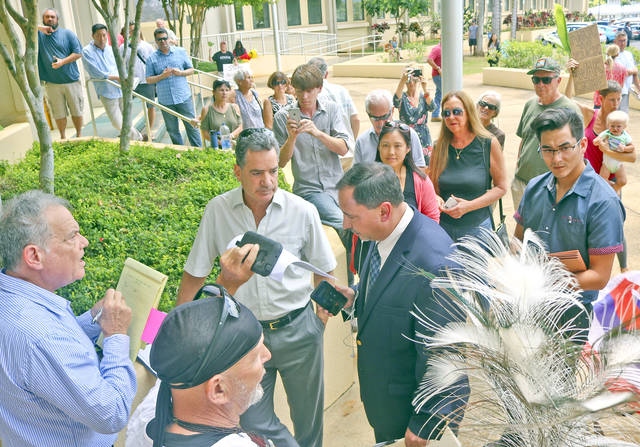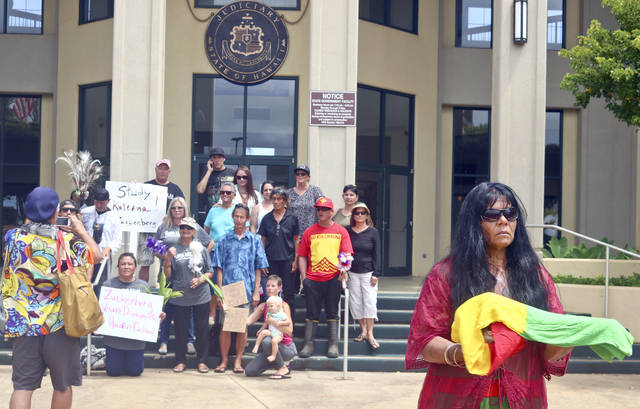LIHUE — Carlos Andrade paid just over $1 million for three of the four kuleana parcels on Mark Zuckerberg’s North Shore estate at a public auction Friday. The remaining land parcel went to a faction of the Rapozo family that put together a $700,000 bid.
The first plot up for auction was the smallest of the four, and sold for the most amount of money, after a short bidding war between Andrade’s attorney, Harvey Cohen, and Craig De Costa, a partner in the Lihue law firm representing a small contingent of defendants in the quiet title lawsuit.
Cohen opened the bidding on the second kuleana at $280,000. De Costa bid $285,000 after a brief consultation with someone on the phone. Cohen quickly upped the offer to $300,000, and the bidding stopped.
Cohen purchased the last two kuleana without contest. His opening offer of $460,000 won a 1.59-acre parcel, the largest of the four, and his $300,000 bid secured the final kuleana for his client, Andrade, who built a small cabin on the quarter-acre plot decades ago.
Andrade paid a combined total of $1,060,000 for the three pieces of land, but the fact that he was not able to buy all four may be significant. Speculation among those in attendance at the auction and allegations in court filings claimed Zuckerberg’s virtually limitless funds would be made available to Andrade at the auction.
How exactly the retired college professor put together over a million dollars remains an open question, but Friday’s auction showed that Andrade’s financing did in fact have a ceiling.
“Unfortunately, we had a ceiling, too,” De Costa said Friday afternoon.
A lawsuit filed Wednesday by De Costa’s firm stated that Andrade’s bid at the auction would be financed by Zuckerberg, an allegation seemingly undermined by the fact that Andrade’s representative halted bidding on the first parcel after his $650,000 offer was topped.
When asked about the apparent contradiction inherent in the fact that he was able to successfully outbid a man his lawsuit accused of being backed by one of the world’s wealthiest people, De Costa speculated that Cohen’s bidding could have been hampered by public-image considerations.
“He might be holding back because of such lawsuit,” De Costa said. “I’d like to see discovery.”
Discovery is a legal process that takes place at the outset of civil court proceedings in which each party can request information from the opposing side related to every charge in the case. In the instance of the suit brought on behalf of De Costa’s clients — two Rapozo descendants with partial kuleana shares — discovery could involve the disclosure of any financial transactions and communications between Andrade and Northshore Kalo LLC, a corporation controlled by Zuckerberg that has gradually and quietly bought a substantial portion of the kuleana shares over the past few years.
Despite only being able to secure one of the plots up for sale, De Costa remained optimistic about the outcome of the auction.
“Even though I bid on the smallest parcel, it’s pretty much the flattest and appears to be the most in-use,” De Costa said Friday after the auction. De Costa speculated that the property he bought could be the most commercially valuable of the four kuleana, but said his clients — a consortium of Rapozo descendants with fractional shares in the land — have no plans to turn a profit, preferring instead to keep the land as a collective family possession.
Meanwhile, the kuleana ownership dispute is far from resolved.
The land could change hands once again at a confirmation hearing, which will finalize the transactions at a later date. At the hearing, the court will accept bids at the hearing from any interested party who submits an offer that is at least 5 percent higher than the winning bid at Friday’s auction. The only stipulation is that the bidders must have a minimum 10 percent ownership in the land or bring enough cash to pay for at least 10 percent of an eligible bid.
For instance, if someone brought $73,500 to the confirmation hearing, they could put in a bid on the kuleana purchased by De Costa’s clients. And any other party at the hearing with a 10 percent stake in the land or the same amount of cash could submit a competing bid, essentially reopening the auction.
But that won’t take place for at least a few weeks. The land sale commissioner, Lihue attorney Patrick Childs, first has to submit a report of the auction, which then must be served to all parties involved 18 days prior to the confirmation hearing.
Andrade’s attorney, Harvey Cohen, left the courthouse immediately after the auction and did not respond to interview requests.
•••
Caleb Loehrer, staff writer, can be reached at 245-0441 or cloehrer@thegardenisland.com.









Just wondering if this Carlos Andrade is the same person who plays Hawaiian music? If so, then he’s music is quite a contradiction of sorts, being so un-Hawaiian in nature.
This very talented, and very Hawaiian man has spent much of his life researching and writing important histories of Kauai, for which this generation and future generations have much to be thankful for. Let’s be thankful he also likes to play music, regardless of whether that music is sufficiently Hawaiian enough to meet the lofty standards of those who, in all likelihood, neither write books nor play music.
Carlos Andrade was a teacher of several courses I took at UH Mānoa circa 2009-2011. I have to state Iʻm not surprised regarding his conduct and total disregard of other perspectives. The ABSOLUTE WORST instructor (not going to give him the title of professor) I ever had. Go figure…coming from a wahine…and a Kanaka…and a scholar…
“Discovery is a legal process that takes place at the outset of civil court proceedings in which each party can request information from the opposing side related to every charge in the case.”
There are not “charges” in civil proceedings. Your reporter did the same stumbling in the Marriott article about a week ago.
This is a BLATANT taking…. and a desecration of Hawai’ian Kingdom, and International law. Ironically the Golden Goose of the Insurgency is about to turn into an ugly duckling….. meaning that the Hawai’ian words on the building above this debacle spell Puuohonua, which means a place of refuge…… and must be honoured as such.
The biblical story of the merchants in the temple come to mind and the only justice at the end of the day is that there will be hell to pay for all the BLATANT crimes against HUMANITY if not on earth, then sooner in Heaven….
Education and Accountability are sorely missing in This charade of land grabbing…. join the conversation on a higher level at:
HAWAIIANKINGDOM.ORG